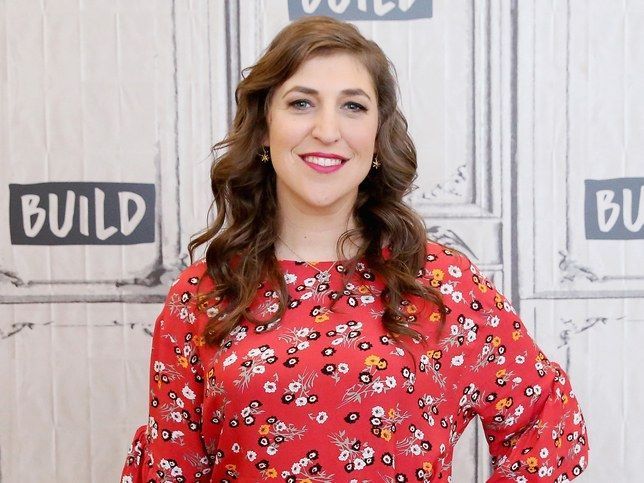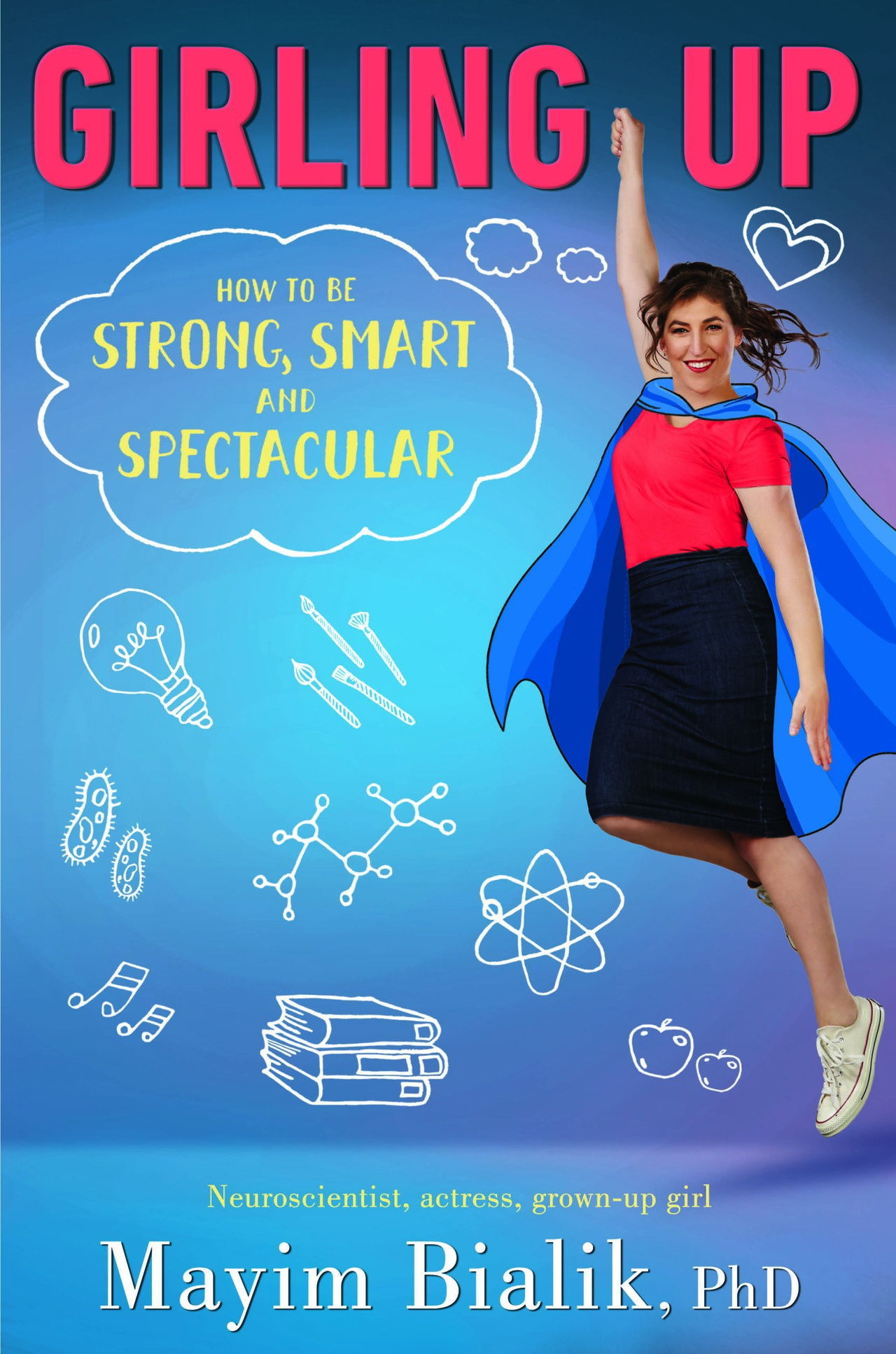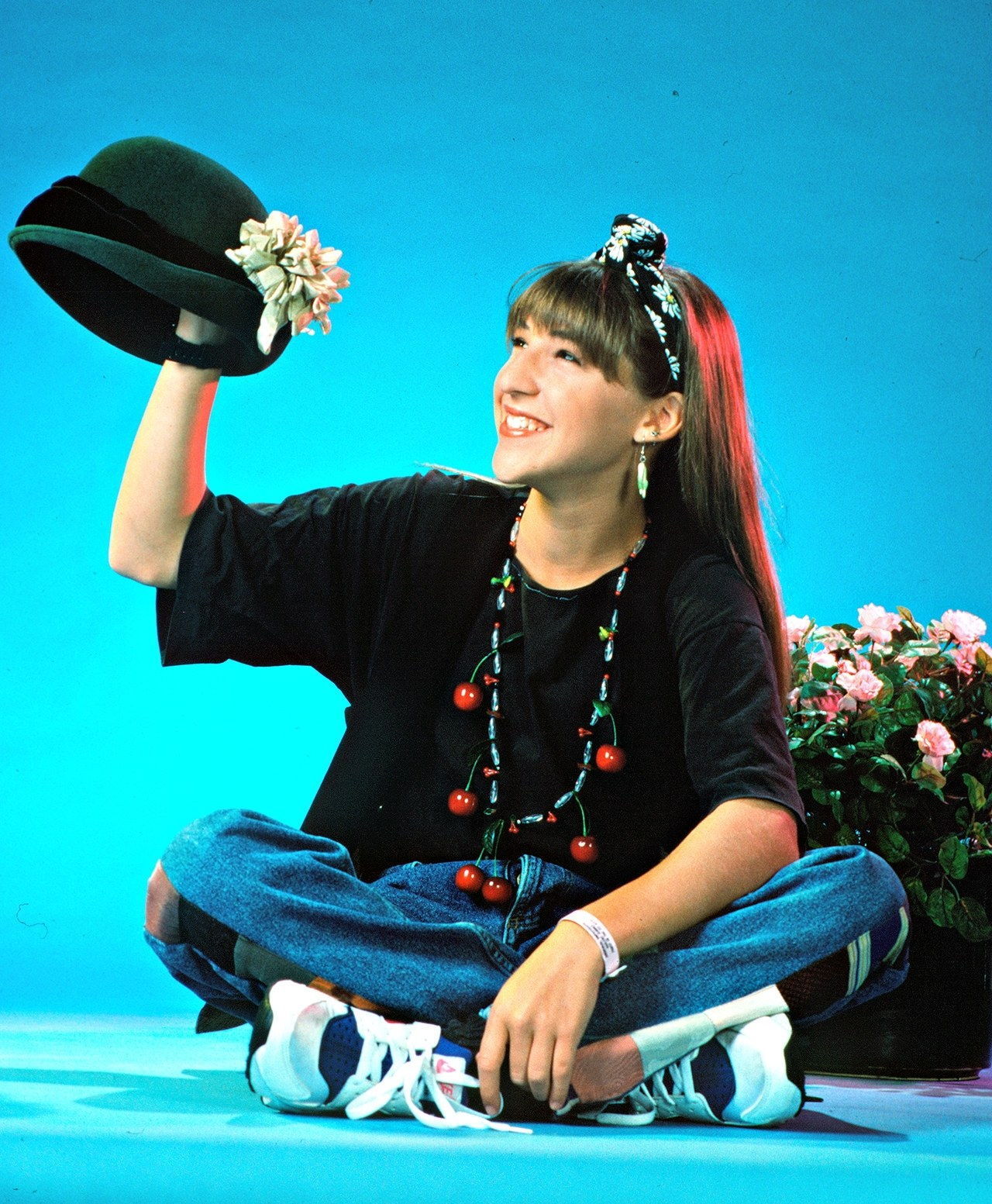Mayim Bialik: “Mental Health Should be as Valued as Going to the Gym or Eating Right”

Mayim Bialik’s new book, Girling Up: How to Be Strong, Smart, and Spectacular (out today), has been a labor of love—though at times perhaps more labor than love. “This was something I was really nervous about,” Bialik tells Glamour. “Someone said to me, ‘What gives you the authority to write this?’ and I said, ‘Well, I’m female, and I live my life just like all of us.'”
But if you’re a Big Bang Theory fan looking for a behind-the-scenes tell-all, this is not your book. Yes, there are mentions of the series—it was a monumental episode between Sheldon (Jim Parsons) and Amy (Bialik) that paved the way for this project—but it’s more about Bialik’s own experiences in the industry and how she’s coped with just about everything thrown her way.
“I really wrote it more like an academic,” she explains. “I was inspired by Natalie Angier, the science writer for The New York Times. I really took her kind of anthropological approach to understanding all things female. I really thought of it more as an academic treatise rather than a personal one because I’m not really, like, a memoir person. That’s not what I wanted this to be.”
Bialik might downplay the personal aspect, but the reason the book works so well for young teens, millennials, and adults is because she opens up about everything from body image to divorce to death to anxiety. Nearly every topic addressed in the book is one that the former teen star has been through herself. It’s that candor that allows the reader—regardless of gender—to take something away from it and leave an impact. She addresses all that and more, below.

Glamour: In the book, you say being in the public eye made you think long and hard about how different the world is for women compared to men. Of course, we’re all equal. Still, we’re extremely different and sometimes we need to celebrate those differences.
Mayim Bialik: Yeah, I think being in the industry highlights how much there is still bias, even unconscious stuff. They’re very strongly gendered.
Glamour: It’s so true. When you talk about being a public figure, you write, “It’s really important to know what other people say about me.” Why is it important for you?
MB: It’s kind of like reading reviews. If you’re only going to read positive things people say about you, that’s not the whole story—either of who you are or of who people’s perception of you is. A lot of people come to my support or defense when I single out comments to clarify them. A lot of people think they’re hiding behind their Internet thumbnail, but the fact is, if someone misunderstands me or misinterprets something, it is possible other people misinterpreted it or misread it as well. When you’re presenting yourself as an authentic person, that means taking the good with the bad. I don’t address every person who hates Jews or hates women, but I sometimes use my platform as an opportunity for other people to learn how to respond to people. So when someone says, “Oh, I’m so tired of you feminists hating men!” I use that as an opportunity to educate people, not to pick on that individual human. I very rarely single people out like that. I really don’t look to. But the fact is, I really want people to know that those people exist, and that is a legitimate, if flawed, opinion, for example, that all feminists hate men, which is ridiculous.
Glamour: You also say—which I love—that “being female in 2016 is far more complicated than any other time in history.”
MB: I think every generation feels like they’ve got it hard or “It’s never been like this,” but when you look at the complexity of this generation, and how close and how far it is from the women’s movement and the civil rights movement…there’s a lot that’s brewing right now. We’ve swung back to what’s kind of a third-wave feminism, which I’m still sort of learning about. I feel like we’ve kind of swung back with equating empowerment with sexuality; in some cases sexuality can be very empowering, but not every single case.
Glamour: There’s a terrific chapter about sex in the book. I especially love the passage where you talk about consent. You write that a lot of the messages we get from music and television tell us it’s a woman’s job to please a man, and you’re basically saying to these young women, “No, you need to understand it’s a two-way street, and ‘No’ always means ‘No.’”
MB: We had the book proofed by a school counselor, and that was actually something she was very adamant about: She wanted me to be very explicit that “no” always means “no.” You always have the final call, no matter how far you are into a date.
Glamour: Let’s switch topics to that of body image. You write that “what a lot of us do—myself included—is to try and find ways to make ourselves look like those people we see images of.” Do you still feel that way? Can you say you’re totally happy with who you are and how you look?
MB: I’m very human about that. I really admire public women and people like Amy Schumer who have really spoken out a lot about being comfortable with “imperfections” in their bodies. I recently interviewed Hunter McGrady, the Sports Illustrated swimsuit model, for Grok Nation and it comes up in my Yahoo! feed all the time. There was just a woman who showed her reverse transformation, going from a size 6 to a size 16 and how empowered she feels. Honestly, that’s totally great for those women. I don’t have those feelings about the “imperfections” of my body at all. It’s something I spoke to Hunter about. I said, “I understand there are some women who love to show off their cellulite and stretch marks; I don’t feel empowered by that.” I think that’s going to vary, and I think both things need to be OK. I don’t feel shamed. I grew up with a very different standard of beauty and attractiveness, as did many women my age. It takes a lot of adjusting for some of us to get used to this notion that all of a sudden things women were teased for and hated for I’m now supposed to flaunt. It’s just not how my brain’s going to work, but I think both things can be OK.
Glamour: Throughout your acting career, were you ever told you needed to change anything about the way you looked?
MB: No. I mean, I always thought about getting a nose job and all of those things because that was the conversation around prominent features when I was growing up in the ’80s and ’90s. But no, there was never anything in particular. I was a very late bloomer, so I didn’t really get curves or anything until the end of Blossom, which was kind of good. I didn’t really think anything about my body. I was very athletic.
Glamour: Was a nose job something that you considered?
MB: No. No. I would be terrified.

Glamour: When you talk about handling stress in the book, you list concrete ways to handle anxiety and overwhelming feelings. One of those ways is through therapy, which I admire you for speaking openly about.
MB: The whole point is—and that’s a great example—is there are a lot of things about my life that are private and should be private about everybody’s life. Mental health should be as valued as going to the gym or eating right or exercising or any of those things. Understanding what you came from, in terms of your childhood, what your motivations are, is so important. I’ve spoken out for the National Alliance on Mental Illness about my family history of anxiety and depression and OCD; I have lots of things that I get to work on in therapy. Also, just having the support of an impartial party in my life is really helpful. There’s a lot that goes on that people don’t get to see. Those are the things I’m not always posting about on social media.
Glamour: Now that the book release is here, what are you most nervous or excited about?
MB: I’m excited to get out there and talk about it because it’s such a no-brainer for me to talk about [these topics]. It’s literarily [me] talking about my experience. I’m going on [The Late Show with Stephen Colbert] for the first time. I’m a really nervous about that!
Glamour: How come? You’ll be a pro!
MB: He’s a huge personality, and I respect him a lot. I want to say the right things. You only have a certain amount of time. You don’t get to do it over, you gotta get it right the first time. Those are all exciting things, but also very nerve-wracking.
Glamour: If you were giving yourself advice about handling high-pressure situations, what would you tell yourself?
MB: Take your trusted publicist with you! [Laughs] And get as much sleep as you can the night before.
Glamour: While you may be nervous, you also are very confident with who you are and what you’re talking about. Where does that confidence come from?
MB: I don’t know that there’s one place; I don’t know that I feel confident about it. I mean, I’m trained as an academic, and I’m an on-my-toes kind of thinker, so that’s just the way my brain works. But there’s going to be plenty of people who don’t like this book, who don’t like what I say, and that’s OK too.
Girling Up: How to Be Strong, Smart and Spectacular, is available for purchase today.
This interview has been condensed and edited for clarity.

